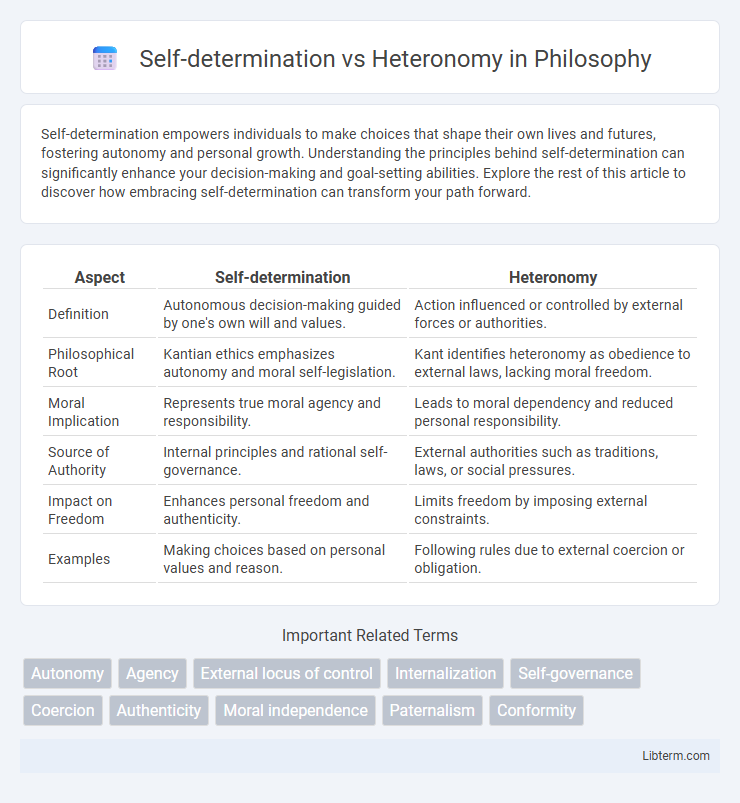Self-determination empowers individuals to make choices that shape their own lives and futures, fostering autonomy and personal growth. Understanding the principles behind self-determination can significantly enhance your decision-making and goal-setting abilities. Explore the rest of this article to discover how embracing self-determination can transform your path forward.
Table of Comparison
| Aspect | Self-determination | Heteronomy |
|---|---|---|
| Definition | Autonomous decision-making guided by one's own will and values. | Action influenced or controlled by external forces or authorities. |
| Philosophical Root | Kantian ethics emphasizes autonomy and moral self-legislation. | Kant identifies heteronomy as obedience to external laws, lacking moral freedom. |
| Moral Implication | Represents true moral agency and responsibility. | Leads to moral dependency and reduced personal responsibility. |
| Source of Authority | Internal principles and rational self-governance. | External authorities such as traditions, laws, or social pressures. |
| Impact on Freedom | Enhances personal freedom and authenticity. | Limits freedom by imposing external constraints. |
| Examples | Making choices based on personal values and reason. | Following rules due to external coercion or obligation. |
Understanding Self-Determination: Definition and Core Principles
Self-determination refers to the capacity of individuals to make autonomous choices based on their own values, desires, and reasoning without external control or influence. Core principles of self-determination include autonomy, competence, and relatedness, emphasizing personal agency, effective decision-making, and meaningful social connections. Understanding self-determination involves recognizing its role in fostering intrinsic motivation and psychological well-being by empowering individuals to govern their own actions.
What is Heteronomy? Origins and Philosophical Context
Heteronomy refers to the condition in which an individual's actions are influenced or determined by external forces, laws, or authority rather than by their own autonomous will, as conceptualized in moral philosophy. The term traces its origins to Immanuel Kant, who contrasted heteronomy with self-determination, emphasizing that moral agents must act according to self-imposed rational laws to achieve true autonomy. Philosophically, heteronomy highlights the tension between external compulsion and internal freedom, raising critical questions about moral responsibility and the legitimacy of authority.
Historical Perspectives on Autonomy and External Control
Historical perspectives on autonomy and external control reveal that self-determination has been a central theme in political philosophy since ancient Greece, where thinkers like Aristotle emphasized individual agency within the polis. During the Enlightenment, philosophers such as Immanuel Kant argued that true autonomy arises from rational self-governance, contrasting sharply with heteronomy, which denotes actions influenced by external laws or authorities. In modern history, struggles for national self-determination reflect the tension between colonial powers imposing heteronomous control and emerging nations asserting sovereignty based on internal autonomy.
Psychological Theories: Motivation and Personal Agency
Self-determination theory emphasizes intrinsic motivation, where personal agency emerges from autonomy, competence, and relatedness, fostering authentic self-regulation. In contrast, heteronomy relates to motivation driven by external pressures or controls, undermining intrinsic engagement and psychological well-being. Psychological frameworks highlight that self-determination enhances effective goal pursuit and resilience, while heteronomous motivation often leads to disengagement and reduced personal growth.
Cultural Influences on Self-Determination and Heteronomy
Cultural influences play a crucial role in shaping self-determination and heteronomy by affecting individuals' autonomy and conformity to social norms. Collectivist cultures often emphasize heteronomy, encouraging adherence to community values and external authority, whereas individualist cultures promote self-determination by valuing personal choice and independence. Research shows that cultural frameworks impact motivation, with autonomy-supportive environments fostering intrinsic motivation and improved psychological well-being.
Education Systems: Encouraging Independence or Obedience
Education systems emphasizing self-determination foster critical thinking, creativity, and autonomy, empowering students to become independent decision-makers. In contrast, heteronomy-based education prioritizes obedience, conformity, and authority, often limiting student agency and reinforcing external control. Balancing these approaches affects student motivation, engagement, and long-term personal development within diverse learning environments.
Ethical Implications: Autonomy in Moral Decision-Making
Self-determination emphasizes the ethical importance of autonomy, granting individuals the capacity to make moral decisions based on personal values and rational deliberation. In contrast, heteronomy involves external influences or imposed rules that can undermine moral responsibility and diminish authentic ethical agency. The tension between self-determination and heteronomy raises critical questions about respect for individual freedom and the legitimacy of moral authority in ethical frameworks.
Self-Determination in Modern Work Environments
Self-determination in modern work environments emphasizes employee autonomy, intrinsic motivation, and the ability to influence work tasks and schedules, leading to higher job satisfaction and productivity. The Self-Determination Theory (SDT) identifies three basic psychological needs--competence, autonomy, and relatedness--that are critical for fostering intrinsic motivation and enhancing performance. Organizations implementing flexible work policies, participative decision-making, and personalized career development programs effectively promote self-determination and improve workforce engagement.
Heteronomy and Social Institutions: Power and Compliance
Heteronomy in social institutions reflects the external imposition of rules and norms, where individual behavior complies with power structures rather than personal autonomy. This dynamic often manifests through legal systems, educational policies, and cultural expectations that enforce conformity to established authority. Power operates through mechanisms of social control, compelling individuals to adhere to institutional mandates that prioritize collective order over self-determination.
Fostering Self-Determination: Strategies for Personal Growth
Fostering self-determination involves cultivating intrinsic motivation, autonomy, and competence through targeted strategies such as goal-setting, self-reflection, and decision-making practice. Encouraging personal growth requires creating an environment that supports choice and acknowledges individual values, which enhances psychological empowerment and resilience. Research in self-determination theory highlights the importance of nurturing autonomy to improve well-being and long-term motivational outcomes.
Self-determination Infographic

 libterm.com
libterm.com